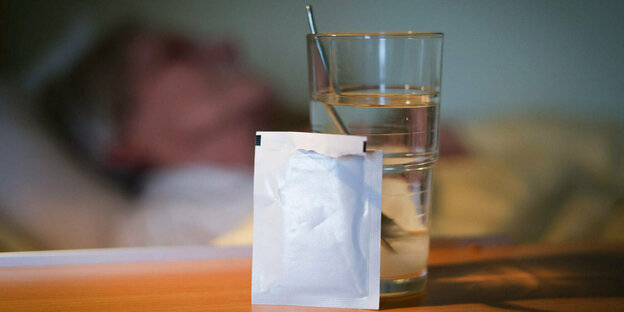The number of assisted suicides is increasing. In 2023 there were 419 cases through the DGHS. It also provides help to those who wish to die with a psychiatric diagnosis.

Euthanasia is a controversial topic in Germany Photo: Detlef Heese/epd/imago
SEDAN taz | Last year, the German Society for Humane Death (DGHS) organized 419 so-called “suicide accompaniment”. In 2022 there were still 229 cases. In total, DGHS President Robert Roßbruch, together with the other two organizations Dignitas and Euthanasia Germany, expects around 1,000 cases of assisted suicide in 2023. The increase in numbers “does not mean a breaking of the dam”, as they fear. those who oppose assisted suicide, Roßbruch said on Tuesday.
In the context of two ongoing or ongoing criminal proceedings against doctors who helped people with serious mental illnesses to commit suicide, Roßbruch commented on the expert procedures that people with pre-existing psychiatric illnesses must go through before receiving help from the DGHS to commit suicide. .
The two doctors had also previously helped people commit suicide through the DGHS. However, in the cases that were or are still charged, they acted on their own initiative without consulting the DGHS. Both doctors were accused of involuntary manslaughter as the direct perpetrator, one of them has already been convicted.
In the 419 cases of suicide assistance provided by the DGHS, “only a few people” had a psychiatric illness as their “main motivation,” said Roßbruch. In these cases, when the documents are examined, “additional specialist medical opinions are required to confirm the existence of the capacity to judge and make decisions,” explained the president of the association.
The principle of the four eyes
In its ruling approving assisted suicide, the Federal Constitutional Court stipulated, among other things, that those who wish to die must act “freely and responsibly” and without being influenced by an “acute mental disorder.”
Roßbruch referred to the “four eyes principle” that applies in the DGHS. Office employees evaluate the motives and judgment and decision-making capacity of those who wish to die based on the documents presented. Then, a lawyer and a doctor go to the client's home to talk. The suicide accompaniment of these two people will then take place in a second appointment. Anyone attempting suicide must have been a member of the DGHS for at least six months.
If a psychiatric diagnosis exists, in many cases it is sufficient for the treating psychiatrist to confirm the patient's ability to judge and make decisions, says Roßbruch. Those who wish to die must present this certificate to the DGHS. The president of the association stressed that the mentally ill should also have the right to self-determination.
In a study by the Munich Department of Health on suicide assistance from three euthanasia organizations, the authors complained that people with pre-existing psychiatric illnesses were also helped to commit suicide without any information on their judgment and decision-making capacity.
Differentiation in psychodiagnostics.
Roßbruch criticized that the authors of the Munich study did not distinguish between “somatic-based psychiatric diagnoses and those of primary origin.” In the case of many chronic somatic diseases, general practitioners and hospital doctors also diagnose depression somewhere: “But it is not a primary depression, but a depression that arises due to the somatic illness. This means that the ability to judge and make decisions is still fully present,” said the president of the association, who is also a medical lawyer.
Of the DGHS doctor-assisted suicide cases, one-fifth cited “satiety of life” as the reason. Another fifth suffered from various diseases, a fifth suffered from tumor diseases and 15 per cent suffered from neurological diseases such as multiple sclerosis or Parkinson's.
The vast majority of those who died were elderly, two-thirds were women. However, of the approximately 10,000 suicides in Germany, in which people commit suicide without outside help, two-thirds are men.